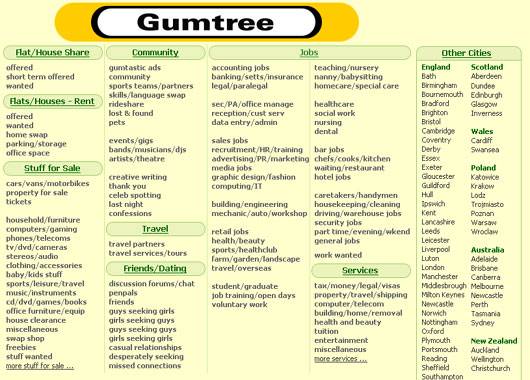When eBay launched their popular overseas classifieds service Kijiji in the United States last month, it seemed sort of an odd move for the company that owns 25% of the leader in the US classifieds space, Craigslist. On a personal level, I wasn’t too impressed.

Kijiji has a hard to pronounce/spell name, an uninviting splash page, and a month later major metros like New York and San Francisco (confusingly labeled as “Bay Area”) have just a handful of listings. But today, eBay is bringing another of its popular international classifieds sites to the US.
Gumtree is the most popular classifieds site in England, and is popular in other European countries and Australia, serving 500,000 new ads every month. eBay today rolled Gumtree out to three US cities, Boston, New York, and Chicago, where it plans to initially market the service to British and Australian ex-pats, according to the New York Times.
“As with other countries, our success in the US will depend on attracting great community-generated content. The ex-pat community is by its nature a transitory population, and so we expect the core site offerings of flats, jobs, cars, for sale and dating to serve the needs of this niche audience.” — Martin Tschopp, GM of Gumtree International
Visually, Gumtree has a much more “Craigslist-like” feel than Kijiji, with the appearance of a visually punched up Craigslist. The layout is more or less identical, if more colorful, and the functionality will be familiar to any Craigslist users. For that reason, and because unlike Kijiji, Gumtree is already popular in English speaking countries, there is perhaps a slightly better chance that Gumtree could gain traction in the US. The New York Times reports that eBay also has plans to bring their popular Spanish-speaking classifieds service Loquo to the US, as well as other international classifieds brands (like Marktplaats).

The strategy is an interesting one from eBay, dubbed a “swarm” by the Times. eBay spokesman, Jose Mallabo told the paper that classifieds “is a very diverse market that clearly wants more choice,” and eBay is helping to fill that perceived void by migrating its overseas brands to the US. It will be hard for eBay to catch up to Craigslist in the US, however. Craigslist has an extremely large user base, brand loyalty, and strong network effect. It reminds me of other large Internet players trying futilely in the past to catch up with eBay on auctions (i.e., Amazon and Yahoo!).
What do you think? Does this strategy make sense for eBay and can it succeed? Would you consider using another service over Craigslist? Do you already? Leave a comment below.

















